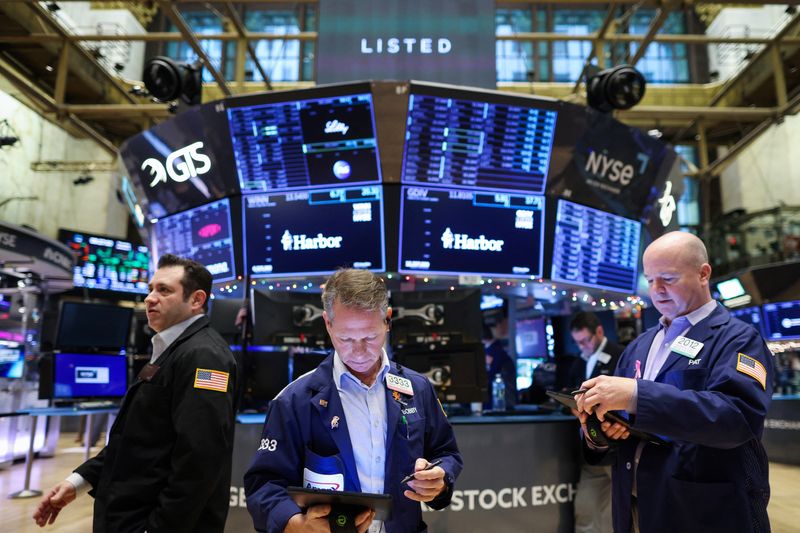
© Reuters. Traders work on the trading floor at the New York Stock Exchange (NYSE) in New York City, U.S., January 5, 2023. REUTERS/Andrew Kelly
By Sinéad Carew and Shreyashi Sanyal
(Reuters) – Wall Street’s main indexes fell on Wednesday after weak economic data and hawkish comments from Federal Reserve officials sparked worries that the central bank may not pause interest rate hikes any time soon.
Before the market opened, U.S. economic data showed retail sales and producer prices declined more than expected in December. Also production at U.S. factories fell more than expected in December and output in the prior month was weaker than previously thought.
With Wall Street’s major averages showing gains so far for 2023, Sam Stovall, chief investment strategist at CFRA research, said some investors saw the week data as an opportunity to take profits while others worried about the prospects for a recession.
“The market was overbought. Today’s economic data served as a trigger to initiate a profit taking spell and the groups with most profits to take have been the ones that have done best last year,” said Stovall.
By 2:14PM ET, the fell 434.27 points, or 1.28%, to 33,476.58, the lost 42.57 points, or 1.07%, to 3,948.4 and the dropped 87.02 points, or 0.78%, to 11,008.10.
The weakest sectors on the day are the defensive consumer staples, down more than 2%, and utilities, which was last down 1.8%.
The benchmark S&P and the blue-chip Dow were both on track for their second straight day of losses, while the Nasdaq, if it ends lower, would snap a seven-day winning streak.
U.S. stocks had started 2023 on a strong footing, with the S&P having closed up almost 4% year-to-date on Tuesday, on hopes that a moderation in inflationary pressures could give the Fed cover to dial down the size of its interest rate hikes.
Roughly halfway through January, the S&P was up 2.7% for the month so far while the Nasdaq was up more than 5% and the Dow, the best performer of the three for 2022, was up 0.9%.
Earlier, St. Louis Fed President James Bullard and Cleveland Fed President Loretta Mester stressed on the need to raise rates beyond 5% to bring inflation to heel.
The Fed commentary also highlighted the disparity between the U.S. central bank’s estimate of its terminal rate and market expectations, which were of the rate peaking at 4.88% by June. Traders are now betting on a 25-basis point rate hike in February.
“This market is very hopeful that we’re going to get a soft landing and every time you have hawkish comments from the Fed, it feels you’re not going to get that,” Dennis Dick, trader at Triple D Trading.
Investors are also focused on the fourth-quarter earnings season as a window into how corporate America is doing against the backdrop of higher interest rates.
Analysts now expect year-over-year earnings from S&P 500 companies to decline 2.6% for the quarter, according to Refinitiv data, compared with a 1.6% decline in the beginning of the year.
IBM (NYSE:) Corp was down 2.6% after Morgan Stanley (NYSE:) downgraded the company’s shares to “equal weight” from “overweight”.
Early gainers Microsoft Corp (NASDAQ:) and Tesla (NASDAQ:) Inc erased gains by late afternoon trading with Microsoft down 1.2% and Tesla off 2.7%.
Moderna (NASDAQ:) Inc rose 3.6% after reporting data which demonstrated the effectiveness of its respiratory syncytial virus (RSV) vaccine.
PNC Financial Services Group Inc (NYSE:) was down 5.4% after the company missed estimates for fourth-quarter profit.
Declining issues outnumbered advancing ones on the NYSE by a 1.38-to-1 ratio; on Nasdaq, a 1.66-to-1 ratio favored decliners.
The S&P 500 posted 9 new 52-week highs and 2 new lows; the Nasdaq Composite recorded 71 new highs and 14 new lows.





